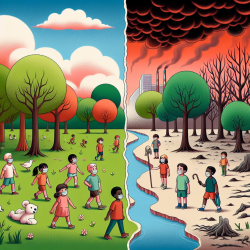Introduction
Climate change is not just an environmental issue; it's a pressing health concern, especially for children. Recent research highlights significant racial disparities in climate change-related health effects in the United States. As practitioners focused on creating positive outcomes for children, understanding and addressing these disparities is crucial.
Understanding the Impact
The research article "Racial Disparities in Climate Change-Related Health Effects in the United States" by Berberian et al. synthesizes evidence that climate change disproportionately affects the health of people of color, including children. The study highlights that children of color are particularly vulnerable to health impacts such as adverse perinatal outcomes, occupational heat stress, and increased emergency department visits due to extreme weather events.
Key Findings
- Children of color, including Black, Latinx, Native American, Pacific Islander, and Asian communities, face higher risks from climate-related health impacts compared to their White counterparts.
- Adverse perinatal outcomes are more prevalent among infants and children of color due to increased exposure to extreme weather conditions.
- Occupational heat stress disproportionately affects children of color, particularly those in agricultural settings.
Implications for Practitioners
As practitioners, understanding these disparities is the first step towards mitigating their impact. Here are some strategies to consider:
- Advocacy and Policy Change: Advocate for policies that address environmental justice and reduce the disproportionate impact of climate change on marginalized communities.
- Community Engagement: Work with communities to raise awareness about climate-related health risks and promote resilience-building activities.
- Data-Driven Interventions: Use data to identify at-risk populations and tailor interventions to meet their specific needs.
Encouraging Further Research
The findings from this research highlight the need for further studies to understand the mechanisms by which systemic racism leads to health inequities among children and adults. Practitioners are encouraged to engage in or support research efforts that explore these dynamics and develop evidence-based interventions.
Conclusion
Climate change is an environmental injustice that exacerbates existing racial disparities in health outcomes. By understanding and addressing these disparities, practitioners can play a pivotal role in fostering health equity and protecting the well-being of all children.
To read the original research paper, please follow this link: Racial Disparities in Climate Change-Related Health Effects in the United States.










